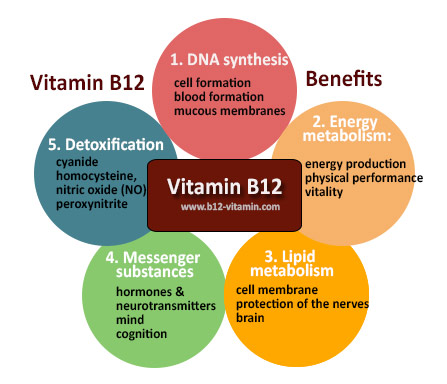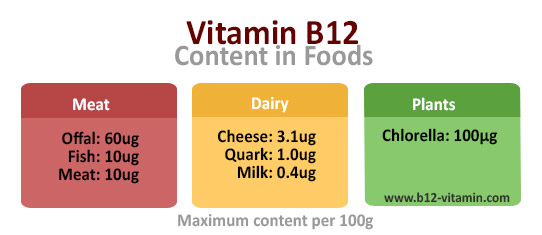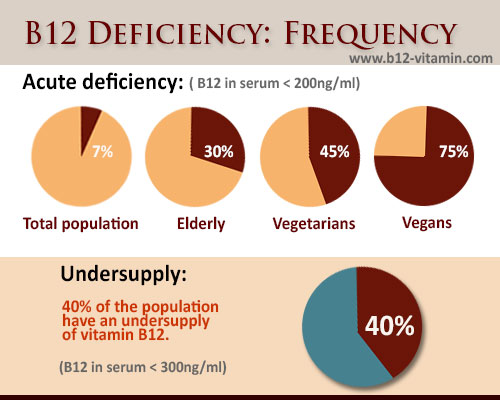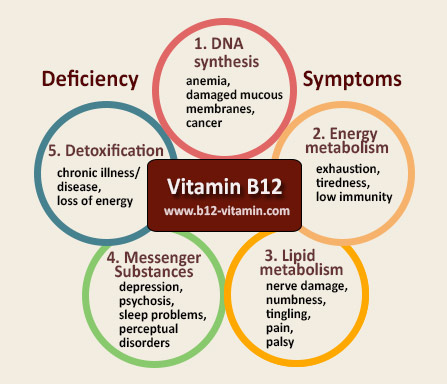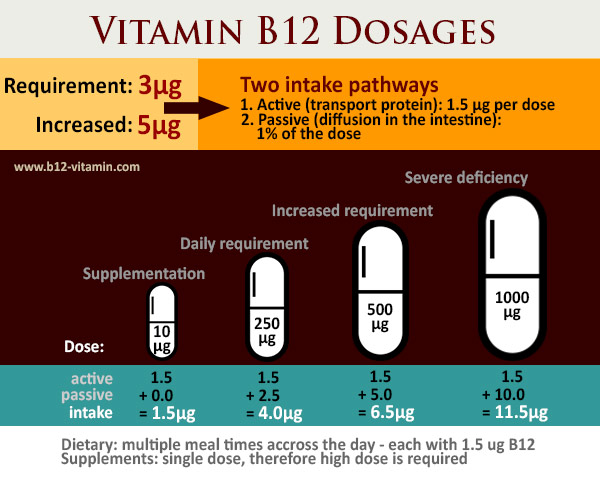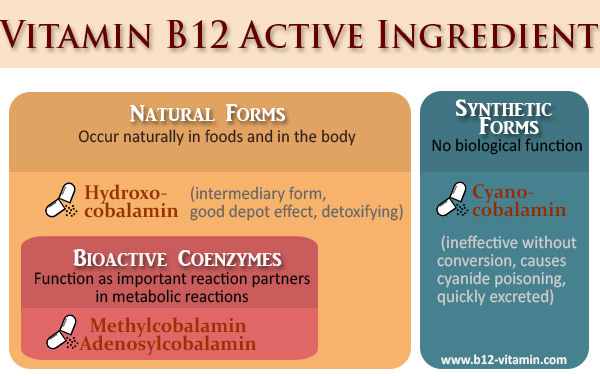Vitamin B12 – Answers at a Glance
Vitamin B12 is one of the most important vitamins for health. But what is it exactly? Where is it found? How much do we need? How is deficiency detected? What are the current B12 blood level tests and how are they read? Which vegan foods contain B12? And when is it necessary to take supplements and at which dosages?
In this article we give an overview of all the need-to-know information on B12, addressing each of these key questions.
The Basics: Vitamin B12 in Brief
- What is vitamin B12?
- Vitamin B12 benefits: what does vitamin B12 do?
- Daily requirement: how much vitamin B12 do you need?
- Vitamin B12 foods: animal and plant-based sources of vitamin B12
Vegan and Vegetarian Sources of Vitamin B12
- Can a vegan diet cause vitamin B12 deficiency?
- Plant-based vitamin B12
- Vegan vitamin B12 supply without supplements – can it work?
- Why don’t herbivores develop B12 deficiency?
- Should vegans take vitamin B12 supplements?
B12 Deficiency: Widespread, yet too Often Undetected
- How common is B12 deficiency?
- Intake disorders: deficiency in spite of a B12-rich diet?
- Vitamin B12 deficiency: early symptoms
- The consequences of long-term vitamin B12 deficiency
- Test methods – how to measure your vitamin B12 status
- Interpreting test results
Curing Deficiency Through Vitamin B12 Supplements
- How high should vitamin B12 dosages be?
- Vitamin B12 overdose
- Vitamin B12 active ingredients: which should you choose?
- Administering vitamin B12 supplements – daily, weekly or monthly?
- Which form is best? Vitamin B12 pills vs capsules vs injections
- Curing vitamin B12 deficiency – how does treatment proceed? (Incl. initial and maintenance therapy)
Testing B12 Supplements:
Vitamin B12 – The Basics
What is Vitamin B12?
Vitamin B12 is highly important vitamin with a central significance for our health. Chemically-speaking, it belongs to cobalamin: a name given to a group of compounds, that contain a central cobalt ion in the middle of the molecule. There are various different forms of cobalamin, some of which fulfil essential functions in our bodies. The many forms of B12 always include the work cobalamin in their chemical name.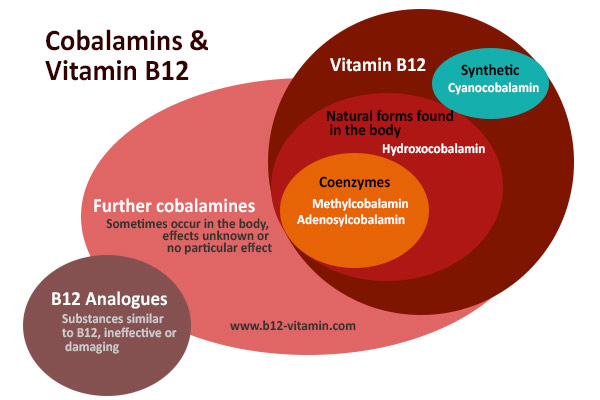
Vitamin B12 Benefits: What does Vitamin B12 do?
Vitamin B12 has an effect on many central aspects of health. As an important coenzyme, it is required by every cell in the body and influences in particular: blood formation, nerve protection, cell division, DNA synthesis, neurotransmitter production, energy generation and the protein metabolism. These multiple workings can be roughly categorised into five areas:
Daily Requirement: How much Vitamin B12 do you need?
- Official recommendations: 2.4 µg – according to the USA Institute of Medicine (IOM, now the National Academy of Medicine); 1.5 µg – according to the UK National Health Service (NHS) and British Nutrition Foundation (BNF)
- Increased requirement: 5 µg – factors which increase an individual’s B12 requirement are illness, stress, toxic stress, pregnancy and breastfeeding
Dietary Supply or Supplement Requirement?
The IOM and NHS/BNF recommend the above amounts as the overall dietary supply. In fact, however, these correspond more to supplement requirements, since these values were determined by injections. Thus, the intake of B12 through the diet should be significantly higher, since not all B12 from the diet can actually be absorbed.
Supplement dosages. Due to the generally low intake of B12, supplement dosages must be significantly higher – thus the daily requirement is covered only with supplements of approx. 250 µg (see below).
Vitamin B12 Foods: Animal and Plant-Based Sources of Vitamin B12
Self-production in the body
Vitamin B12 is not produced in plants but in bacteria (microorganisms), which can be found in the earth as well as in the gut of humans and other animals. In theory – with ideal, healthy intestinal flora – these bacteria will produce a portion of the required B12. In practice, however, almost everyone depends on a supply through the diet.
B12 in meat and animal products – vitamin B12 can be found in almost all meat and animal products. The largest concentration is found in offal (liver in particular) and then continues to decrease through lean meat to dairy products.
Plant-based vitamin B12 – one of the few plant sources of B12 is the fresh water algae chlorella.
Vegan and Vegetarian Sources of Vitamin B12
Can a Vegan Diet Cause Vitamin B12 Deficiency?
Vitamin B12 deficiency almost always arises through intake disorders, which affect people of all eating habits alike. However a vegan diet contains almost no sources of B12, which increases the risk of deficiency. Vegans are thus much more likely to suffer from B12 deficiency, statistically-speaking.
Plant-Based Vitamin B12
At present, it is only certain that the freshwater algae chlorella contains a guaranteed vegan source of B12, provided that it has been grown naturally (not under sterile farm conditions). Obtaining proof from the manufacturers of appropriate conditions here is thus highly worthwhile. In the case of other plants, no constant B12 content has yet been determined. While organic vegetables sometimes contain small amounts of B12 from the soil, it is usually washed off during food preparation.
Some algae have erroneously been believed to be sources of B12, but they actually contain only vitamin B12-like molecules that have long been mistaken (vitamin B12 analogs).
Vegan Vitamin B12 Supply without Supplements – Can it Work?
There are no vegan food products, which naturally contain a sufficient amount of vitamin B12. Today, however, much produce is enriched with the vitamin – and thus, through this means it is possible for vegans to cover their B12 requirement through a “regular diet”.
Seen objectively, however, there is ultimately very little difference between B12-fortified produce and supplements. Yet for those who are reluctant to take tablets or capsules, then – of course – enriched vegan products are a useful alternative.
Why Don’t Herbivores Develop B12 Deficiency?
Vitamin B12 is produced by microorganisms that occur in the soil, in some algae, and above all in the body of humans and animals. In ruminant animals (i.e. grazers), these bacteria produce sufficient vitamin B12 in the rumen; no external dietary intake is needed. Other herbivores obtain low levels of B12 in their diets through soil and faeces, which also contain B12-producing microorganisms.
For humans, self-production of B12 through the intestinal bacteria is theoretically possible, but rarely achieved for health reasons, which is why humans today depend on a dietary intake of B12 in almost all cases.
Should Vegans Take Vitamin B12 Supplements?
Because of the increased risk, today all vegan associations encourage vegans to take B12 in the form of fortified products, supplements or algae. An endogenous supply is theoretically possible, but only with extremely good intestinal health. Here, many factors have to be accounted for – e.g. nutrition, detoxification, de-acidification, antibiotics, bacterial strains – and thus the required conditions are almost never obtained.
Vitamin B12 Deficiency
How Common is B12 Deficiency?
Experts continue to argue over which blood values signify a vitamin B12 deficiency. Recent research shows that the current limit (200 ng/ml) is probably too low. According to more realistic limits, nearly half of the population of all western industrialised nations are suffering from B12 deficiency.
Malabsorption: Deficiency Despite a B12-Rich Diet?
Vitamin B12 deficiency often occurs even when individuals consume a plentiful supply of B12 through their diet. The most common cause is malabsorption, which impede the utilisation of the vitamin. The main causes of a vitamin B12 deficiency are as follows:
- Malabsorption – due to poor intestinal health (inflammation, bacteria, fungal infection, parasites, disturbed intestinal flora) due to a lack of transport molecules (intrinsic factor), genetic diseases (cobalamin disease) or medications that hinder uptake.
- Increased requirement – in pregnancy and whilst breastfeeding, through stress, toxic- or radical load.
- Low dietary supply – through a vegetarian or vegan diet.
Of course, all three causes can also work in combination.
Vitamin B12 Deficiency: Early Symptoms
The body has a store of vitamin B12 in the liver and, as a result, can live for several months or even years without a B12 supply. Once this store has been depleted, however, deficiency symptoms slowly set in.
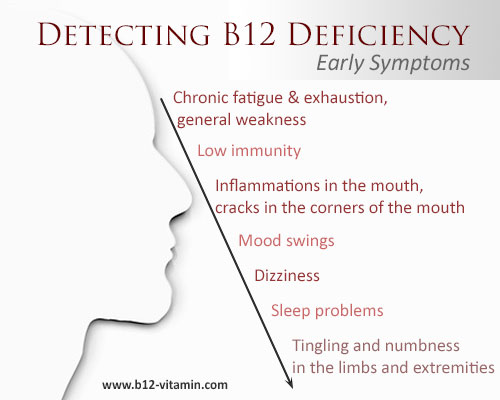
Step-by-step, these develop from general exhaustion, tiredness, susceptibility to infections and disorders of the mucous membranes; through nerve disorders such as tingling and numb limbs; psychological symptoms such as depression or psychosis; to severe physical symptoms such as anemia, paralysis, dementia and other cognitive disorders.
The Consequences of Long-Term Vitamin B12 Deficiency
If a vitamin B12 deficiency is not recognised, gradually more and more symptoms appear. A prolonged deficiency leads, in the worst case, to lethal anemia, irreparable nerve damage, severe paralysis, chronic pain, severe mental and psychological symptoms and a complete lack of energy.
Test Methods – How to Measure Your Vitamin B12 Status
Even with a good B12 intake through the diet, the supply is not always safe; unfortunately, many people have a poor receptivity to the vitamin. A B12 test is therefore generally useful for all people. There are two ways to measure the B12 supply:
- directly measure B12 in the blood
- measure certain decomposition substances in the urine, which accumulate in the instance of deficiency
According to both routes there are different methods.
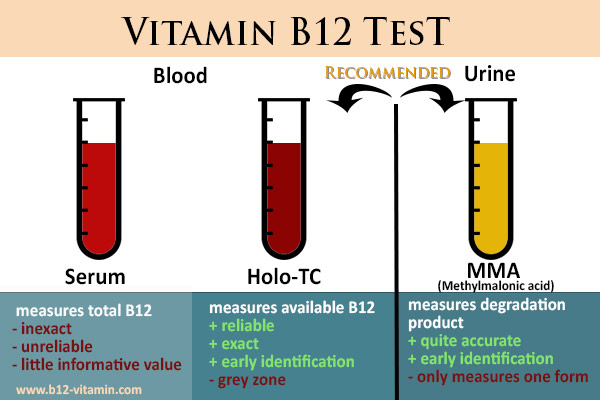
The serum test measures all B12 present in the blood, as well as all substances that are chemically similar to vitamin B12. However, a large part of the B12 measured in this way is not usable by the body. This test is therefore highly inaccurate and provides only partially useful results.
A better option is the so-called holo TC test, which measures only the vitamin B12 that is genuinely available to the body. It thus provides good information about the supply.
In addition, the MMA urine test is a useful choice, measuring excreted, decomposition substances. It also allows for fairly reliable conclusions to be drawn about the B12 supply. Today, holo TC and MMA tests can also be performed as self-tests at home.
Interpreting Test Results
Here is an overview of the interpretations of various test results.
Serum test – two different units are used (pg/ml and pmol/l).
| Interpretation | Serum value pg/ml | Serum value pmol/l | Treatment |
| Severe deficiency | < 150 pg/ml | < 110 pmol/l | Injection |
| Deficiency | < 200 pg/ml | < 150 pmol/l | Injection or 1000µg oral |
| Possible undersupply | 200-300 pg/ml | 150-220 pmol/l | 500µg oral |
| Normal status | 300-900 pg/ml | 220-665 pmol/l | – |
Holo TC test
| Interpretation | Value | Treatment |
| Vitamin B12 deficiency | < 35 pmol/l | Injection or 1000µg oral |
| Grey area, deficiency or undersupply | 35-50 pmol/l | 500µg oral |
| Good vitamin B12 supply | > 50 pmol/l | – |
MMA urine test – once again there are two different measurement units used. Here is the listing for the unit mg/g.
| Interpretation | Value | Treatment |
| Severe deficiency | > 5 mg/g | Injection |
| Deficiency | 2.5 – 5 mg/g | Injection or 500-1000µg oral |
| Undersupply | 1.8 – 2.4 mg/g | 500µg oral |
| Good supply | From 1.8 mg/g | – |
Treating Vitamin B12 Deficiency with Supplements
How High Should Vitamin B12 Dosages be?
The dosage of B12 required depends on three key factors. Firstly, the purpose of the intake: does the individual require replenishment treatment, deficiency therapy or simply as an everyday dietary supplement? Secondly, on how good the intake ability of the individual is, considering stomach and gut health, toxic strain and/or increased need. And lastly, depending on the quantity of B12 that is consumed through the diet.
Here are the general guidelines for oral treatment:
1. Additional supplement: 10-50µg
2. Covering the total daily requirement (under normal circumstances): 250µg
3. Increased need & therapy for a light deficiency: 500µg
4. Therapy for a severe deficiency: 1000µg
Supply vs Intake: Not all Vitamin B12 can be Absorbed
These rather high dosages are explained through the biological mechanism that enables the body to intake vitamin B12. The vitamin is absorbed in two ways:
- Active – through a special transport molecule (intrinsic factor) – saturated at approximately 1.5µg per dose/meal
- Passive – through vitamin B12 that passes through the intestinal wall without a transport molecule – maximum 1% of the supplied dosage
The real intake is calculated through the combination of these two mechanisms.
Vitamin B12 Overdose
Is it possible to overdose on vitamin B12? The answer to this question is quite simple: no. It is not possible to overdose on the vitamin, as any unused B12 is excreted through the urine. A toxic dose has never been recorded.
Vitamin B12 Active Ingredients: Which Should you Choose?
Currently, there are four different forms of vitamin B12 supplements, which each have a slightly different effect.
Natural: hydroxocobalamin
Bioactive coenzyme: methylcobalamin & adenosylcobalamin
Synthetic: cynanocobalamin
As a reaction partner, the body can only directly use the bioactive coenzyme forms of B12; other forms must first be transformed in the body. The body needs both coenzyme forms because they are required for different reactions.
Hydroxocoblamin is the natural form of vitamin B12, produced by microorgansims. Hydroxocobalamin is the first choice when it comes to injections and high-dose initial therapy; it is excellently absorbed and utilised by the body and has a long depot effect. What is more, hydroxocobalamin has an antioxidant effect. In the body, it is transformed into both bioactive coenzyme forms: methylcobalamin and adenosylcobalamin. Methylcobalamin works in the cell plasma; adenosylcobalamin enters into the mitochondria (the “power plant” of the cell). In human blood, hydroxo- and methylcobalamin are found in approximately equal proportions. Vitamin B12 is stored in the form of adenosylcoabalamin in the liver.
In oral supplements it is primarily methylcobalamin that is used. The sole use of methylcobalamin is however criticised for being a one-sided provision, which is why today it is combined with other natural forms. This makes supplements more similar to the natural kind of B12 in foods and a combination of methylcobalamin, adenosylcobalamin and hydroxocobalamin is considered ideal.
In nature, the chemical form cyanocobalamin does not occur and must therefore be transformed in the body in order to take effect. As an active ingredient in supplements it is not recommended, because – in addition to its low efficacy – a low cyanide pollution also occurs.
Administering Vitamin B12 Supplements – Daily, Weekly or Monthly?
Oral supplements should be taken daily – a weekly dose is not recommended. B12 is best taken either one hour before or after a meal.
Injections are taken at different intervals depending on the treatment plan. They are usually administered weekly at first, and then monthly.
Which Form is Best? Vitamin B12 Pills vs Capsules vs Injections
Vitamin B12 supplements can be divided into two main groups:
- Injections
- Oral supplements (capsules, tablets, drops, spray)
Injections
In regular cases, oral supplements are completely sufficient; in certain instances, however, injections are advantageous e.g.:
- For severe deficiency
- For pronounced deficiency symptoms
- For severe stomach and intestine conditions
Oral Supplements
In regards to oral supplements, the various forms mainly differ according to their additives:
- Capsules are the purest and best form of oral B12 supplements
- Drops/spray are easy to use and good for children and adults who have difficulty swallowing
- Tablets mostly contain many additives and have no particular advantage
- Lozenges (sublingual intake) have no advantages over capsules, according to studies – but are more convenient to take
Curing Vitamin B12 Deficiency – How Does Treatment Proceed?
A vitamin B12 deficiency is always treated through a therapy with supplements. With a slight deficiency, a therapy with oral supplements is completely sufficient. The treatment of a severe deficiency is divided into two phases:
- High-dose restorative therapy (injection)
Through injections with B12, the body’s depleted stores are replenished and blood values quickly raised - Maintenance treatment (tablets/capsules or injection) Through an oral follow-up treatment, values are stabilised and maintained.
In the case of very severe uptake disorders, a lifelong maintenance therapy with injections may be necessary if absorption through the intestine is no longer possible.
Selecting Vitamin B12 Supplements
How to Compare Various Vitamin B12 Supplements
When choosing a vitamin B12 supplement, there are several criteria to consider:
- Dosage: the correct dosage for the purpose of use (see above)
- Active ingredient: prioritise natural forms (see above)
- Additives: pills especially have many unnecessary, potentially dangerous additives, whereas capsules are purer
- Trusted sources: sometimes cheap imitation supplements are on sale – here quality active substances and purity cannot be guaranteed.
More information:

